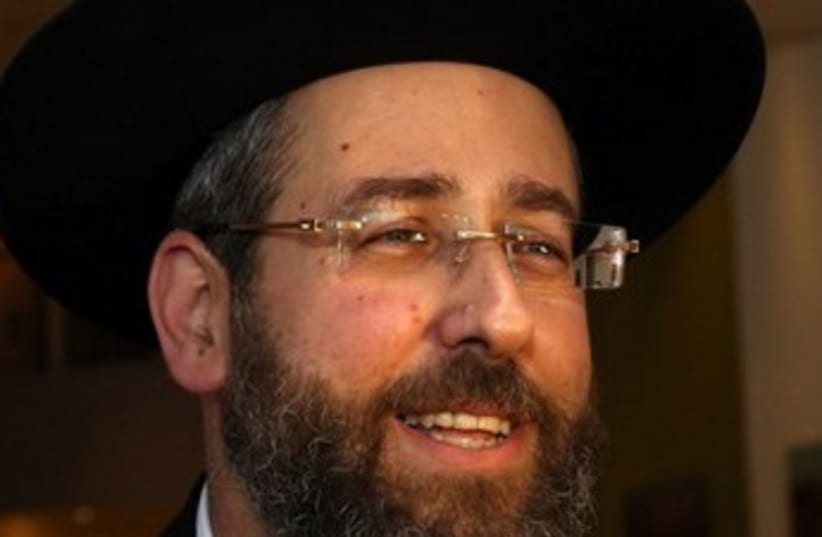The recent election of the country’s new chief rabbis raised larger questions regarding the entitlement of spiritual leaders to inherit their fathers’ positions. Four of the leading candidates were sons of previous chief rabbis – including the two victors, rabbis Yitzhak Yosef and David Lau. While some expressed concerns over nepotism, others noted that rabbinic history (and international politics) is replete with family dynasties.
Yet is this mandated by Jewish law? The Torah declares that two positions are hereditary: the priesthood and the monarchy. Regarding the former, the Torah asserts that the direct descendants of Aaron will serve as kohanim, mandating a careful preservation of pedigree that remains intact today. Similarly the Torah commands the bequeathal of the kingship from father to son (according to some scholars, the monarchy passes to a daughter in limited circumstances). Decisors debated whether the oldest son was automatically entitled to the throne, with some arguing that the standing king decides which child receives the kingship, as proven by David’s selection of Shlomo, who was not his first-born.
Hereditary succession was also enacted in late antiquity for the political position of the patriarch (nasi), but significantly only after the passing of Hillel in 10 CE. While similar arrangements also existed for Babylonian exilarchs, Nahmanides and others successfully overthrew the Jewish aristocracy in 13th-century Barcelona by arguing that the children only receive preference when they are equally qualified for the task.
A similar sentiment pervades many sources which indicate that hereditary succession should not be the norm, especially in matters of spiritual wisdom. Familial succession does not occur in the Book of Judges, and most significantly, Moses handed the reins of leadership to Joshua, not his children. While some sources indicate that they were not sufficiently qualified, other texts indicate that they were capable but passed over because Joshua was worthier. Indeed, a famous rabbinic maxim asserts that God granted three crowns to the world: The crown of royalty was given to the House of David, the priestly crown was granted to Aaron’s lineage, but the crown of Torah is granted to anyone who wishes to take it. One Talmudic passage even asserts that children of sages are frequently not scholars themselves because, among other reasons, they often possess a sense of arrogance that makes them believe wisdom can be inherited.
Medieval decisors debated which communal positions had hereditary rules of succession.
Maimonides asserts that inheritance should apply to all positions of authority as long as the heir displays sufficient fear of God and possesses minimal knowledge. Accordingly some scholars have argued that even the position of a charity collector should go to an heir unless he is vastly less qualified than other candidates. Rabbi Shlomo Ibn Adret (Rashba) asserts that popular practice allows for a son to inherit the cantor’s position, even if his voice is not as fair, as long as he upholds proper virtues. While this position was codified in the Shulhan Aruch, many commentators have asserted that Rashba’s claim is contingent on local practice and that the letter of the law does not require hereditary succession for prayer leaders.
Whatever its basis, many scholars have contended that heirs should receive preference for rabbinic positions – a practice that, as Shaul Stampfer has documented, reached its zenith in the modern era in 19th-century Eastern Europe. Some have modified this claim to assert that sons (and sometimes sons-in-law) only gain preference when they are as qualified as other candidates and that they still require communal assent. Yet other scholars adamantly reject the notion of rabbinic inheritance. They argue that the crown of Torah must be determined by wisdom and skills alone, especially given the crucial role rabbis play in promulgating knowledge and adjudicating justice.
Indeed, in the later medieval and early modern period, many Ashkenazic communities prohibited a son from succeeding his father, since they feared that an extended hold on power would make it impossible for the rabbi to serve impartially as an ecclesiastical judge. This contrasted with the practice of early medieval communities, where spiritual leadership remained concentrated within the hands of a select group of families, albeit not necessarily through the formal rules of inheritance.
In the 16th century, Rabbi Moshe Isserles affirmed a son’s preferred status, unless the community declared from the outset that rabbinic appointments had term-limits and would not automatically fall to the children. This has major implications for contemporary appointments (political and spiritual), which are frequently made under strict employment conditions that preclude automatic bequeathal. A series of authorities, including rabbis Moshe Sternbuch, Mordechai Eliyahu and Shaul Yisrael, have all affirmed that many contemporary rabbinic duties preclude, by default or prearrangement, automatic inheritance of positions. Lau and Yosef earned their recent appointments through merit and politics, but Halacha did not mandate that they be chosen for the positions.
The writer teaches at Yeshivat Hakotel and directs the Tikvah Israel Seminars for Post-High School Students.
Facebook.com/RabbiShlomoBrody.
